- Home
- Luis Alberto Urrea
The Water Museum Page 2
The Water Museum Read online
Page 2
He used to man a roadside stand this side of Taco John’s where he sold rock crystals and petrified wood he found in a secret canyon up the side of the butte. He had a little sign on his petrified dino dung box: COPROLITES ARE GOOD SHIT. People were probably offended. He sells his rocks on eBay now.
Ralph: “Hunt, hell. Crawling around with your ass in the air. At your age.”
“You’re a bold talker for a newcomer,” The Professor says.
“Been here since nineteen seventy,” Ralph says.
The Professor winks at Frankie.
“Dear boy,” he says. “I painted the nineteen sixty-three number up on the butte. Used house paint and brand-new rollers that I stole from the janitor’s office at Benson Hill. You can’t top that.”
Ralph rattles the page. He is sick of history. “Congratu-goddamn-lations,” he says.
The tradition started in 1923, after the last Indian died up on the butte. They called him Joe, and some cowboy brought him down on a mule. His little valley was where the Class of 1923 made their ascent to paint their graduation date on the lowest available cliff. It was a scandal—the leader of this wild bunch, Billy Pepper, faced a night in the hoosegow until his pap and Mr. Benson himself came and bailed him out. He was mostly in Dutch for drinking, but the town leaders secretly saw a nice tradition being born. The butte knew, if they didn’t, that the top of the 23 was at the height where great sharks and whales once swam, and where the smoke of old Joe’s last chimney fire hovered as he burned all his letters from his dead wife and his Bible before he lay himself down on the floor of the cabin to sleep forever. Now there is no trace of his house except for the bulbs that break from the ground every April and start to bloom.
The Professor always loved to lecture about the numbers when he subbed the history classes. They weren’t in any particular order—24 was right beside 23, but 25 was far off to the west. It depended on the moxie of the painters, didn’t it. How high were they brave enough to climb? How long were their ropes? His line was: “Junction’s numbers are what hopes and dreams look like.” For these were the best moments of their lives. These were the doorways into imagined futures. Doors they thought were swinging wide, though perhaps only their grandfathers knew the doors were actually slamming behind them.
So 58 abuts 90; 92 bleeds downhill into a feminine-looking 88; 68 is the funny one, but what do you expect? The 8 is two stacked flowers with white petals and yellow hearts—hippies even out here. Some of the numbers seem to have small beards, but these are cascades of dung from peregrine and buzzard nests.
It was 1949 that was the first time people believed the tradition was going to die out. By then, they had made postcards of the numbers, and Frankie’s folks sold them in a wire rack beside the cash register. None of the GIs seemed to want to return home. Those Mountain Men who’d made it back from Guadalcanal and Arles were out there bombing around the USA in jalopies and on motorcycles. Nobody wanted to come punch cows or dig uranium at Arco or try to grow alfalfa or run sheep up on the highlands. That was when the ranches began to die out. Things slowed down, and the first old-timers pronounced The Death of America and The End of the Way Things Were Supposed to Be. But they were off by a few decades. It was really the 1960s that killed them all. Freeways appeared far from New Junction’s city limits, and tourists jumped out of the valley and drove the big roads instead, taking their money with them.
Benson Hill closed in 2000. At least Frankie’s daughter graduated before that. “Oh my Lord,” Frankie thinks. Every once in a while she remembers that she is going to be a grandmother.
She doesn’t like it when The Professor talks about all the stories. It just reminds her that ’Junction is blowing away, bit by bit, and Benson Hill is closed and the Colorettes are gone, and the Sinclair with its grand view of the butte is where Stick used to work and she can still see him smoking and staring up at the numbers and then she sees Son in his silly white bell-bottoms. It’s not right, is what she thinks. Is a town dead when the old men die, or when the children leave?
Ralph and Miss Sally are playing with The Professor. The numbers game. Frankie wishes she had one of those iPod things to shut their voices out. Son Harding used to like crazy new music back then—Yes and Alice Cooper. She’d listen to that right now if she could.
She drops big blues in front of each client, steaming hot. Dabs of butter running in yellow rivulets down their sides. “One Butte with Lava,” she says as she delivers each muffin.
Ralph says, “Nineteen forty-one.”
“Oh well. What a year! We were, of course, at war. Benson Hill boys were patriotic, I tell you. They went in high numbers to the Pacific theater.”
Frankie is thinking, Sonny always told her he’d take her all the way to the ocean—any ocean—if she’d leave Stick and run away with him. Crazy boy. Wrote her the only poems she ever got from anybody.
The Professor: “That number was painted by a young cowboy with jug ears. Name of Wally Wachtel, known as Big Double for the two W’s in his name, don’t you know. And his poor old ears. The only big things about Wally were his ears and his hat.” He laughs. “Wally undertook that project after the prom. Climbed up there alone. If you were to climb on up there, you’d see across the white number four is the name of his sweetheart, Pru Speich. Poor dumb bastard misspelled ‘Pru’ and wrote ‘P-R-O-O.’ Still there. He was shot in the head by a Japanese sniper in the Philippines. His body never came home.”
Ralph: “Well, ain’t you a bundle of joy.”
The Professor: “Natural selection, my friend.”
Ralph tosses some money on the counter.
“Christ,” he says. “Now it’s evolution.”
“What a newfangled idea,” The Professor mutters.
The butte knows that Big Double Wally saw eagles fly in a mating dance as he struggled up. That he almost fell. That the entire valley floor, once drained of ocean, became another kind of sea—red and orange and screaming hot as the lava rolled across the flats. Ferns, palms, ancient shaggy pines bursting into flame and vanishing under the languid waves of melted stone. Air so hot the flying creatures trying to migrate burst into flame and plunged into the inferno. And Big Double hanging from his little rope, swinging like a pendulum for a minute of sheer terror, shouting, “Oh gravy!”
Miss Sally: “Frankie, dear—your own dad painted the fifty-nine, don’t you know.”
“Yep. Know it.”
Frankie thinks about some of the maneuvers she led the Colorettes through at the games: drop spins, crazy-eight carves, flutters, toaster turns.
Ralph leaves and doesn’t shovel the pile outside her door.
* * *
The sun has moved on to that Pacific shoreline she never saw, and it is all probably turning copper and cool at the end of a long day. Here it is still hot, and quiet, and the glow fires up the top half of the butte. She is sitting in her truck, staring at 77, wishing she still smoked. The renegade steer from the morning is lurking beside one of the trailers across the way, and it eyes her, then bellows. She starts her engine and it trots across the street toward her. “What do you think?” she says out loud. “Do I look like a rancher to you?” The steer lows and eyeballs her. She puts the truck in gear. “Do I look like I’m hauling hay to you in some field?” She lowers her window and says, “Shoo.” She waves her hand. He shakes his horns and bellows again.
As Frankie drives away, she watches the steer in her rearview, trotting after her.
“Don’t you beat all,” she says.
She is tired and her feet hurt. That hip is trying to lock up on her again. She thinks she’ll be darned if she lets her hip or this crazy little bull keep her from going inside and watching her shows. She smells like food—it’s the worst part of her day. If she washes the grease smell out of her hair, she’ll be blow-drying it for hours. Coming home smelling like fried flesh, she can hardly bear to eat. She usually gives herself a bowl of Special K and some iced tea. Watches shows on the satellite where peopl
e buy houses on beaches on islands and basically sunburn for a living. She doesn’t drink much, but she does have a weakness for a bowl of ice cream. And she likes a hot soak and a good book. But tonight she feels the hollow spot, and she drops a splash of Southern Comfort into her Diet Coke and then another.
Outside, the chain-link rattles. Stupid cow.
“You better not eat my flowers,” she says.
She laughs for a minute—what is the neighbor going to think when she sees Frankie has a new bull?
It’s time for her bath. She has a good mystery she’s been working on—a Sara Paretsky. In those books, Chicago seems like some kind of Star Wars city to her, like Oz, if Oz had lots of murders. She can’t imagine what it would be like to walk the streets of that giant canyon of crystal and stone. And that lake! Why, they were never going to run out of water. And her daughter. In the city. Just about to pop. Frankie saves calling her for later. “Oh, Sammy,” she says. Sammy is the only thing that makes her cry. Sammy and the little peanut she’s bringing into the world.
Tub’s running. She should save this water for the tree and the steer. When she looks at herself in the mirror, she feels like the drouth has taken all her own water from her, just like the little ranches all about. It takes eight thousand gallons a day to grow enough forage for cattle, and to keep the cows and horses alive.
Her braid looks like straw. Her chin has dropped. Her shoulders are slumping. She cringes when she remembers when Sonny and Stick thought she was the prettiest, most interesting girl in this entire state. How poor Son tried to get her away from Stick. “Your skin is like new snow,” he’d tell her. What kind of thing was that to say? It must have come out of his books he was always carrying around. Nobody talked like that. Not to Frankie. It shook her, bad.
The picture of Son is in the hallway, outside the bathroom. She touches his face when she goes to bed. He had the softest hair she ever felt, on a girl or a boy. She always wishes she could touch that hair one more time. Poor old Stick hangs in the kitchen, beside the fridge.
She calls Sammy most nights, but the Southern Comfort has made her sleepy. Besides, sometimes Frankie senses that she bores her daughter. And Frankie can’t bear to be boring anymore. Frankie says a prayer every night and settles in to listen to the all-night UFO shows on the AM radio.
On her left hip, where nobody sees it, her only tattoo: 1977.
* * *
Stickshift, so they called him—on account of his ability to drive anything with a motor—never forgave Sonny for leaving the Mountain Men. He probably suspected Frankie and Sonny had some secret thing going on in the little theater, but then Son was just a drama fag. Right? Shit, they probably shared lipstick and pantyhose! Haw. The boys laughed at that.
Frankie was loyal to Stick, of course. They were going to marry after school ended. Stick was going to run the gas station and expand the garage beside it to service all the cars and tractors and trucks between here and Boise. He wasn’t much of a reader, unlike Frankie, but he brought her paperbacks when he went on runs with his dad, delivering machine parts into Oregon. Sonny, though. Sonny came at her with poems and paintings and drawings and records. Son smelled her hair and teased her till she laughed so hard she cried. And they acted together like they were dancing.
But even Frankie’s dad said Son was no-account. A hippie. “You can’t eat poems,” he told her.
It was after the senior prom when Son came up to her at the bonfire at the foot of the cliffs. Everybody was drinking. Stick was blitzed and sleeping in his truck. The Colorettes were roasting marshmallows for the boys. And Sonny sidled up to her and smelled her neck. The bolts of lightning that shot down her body made her jump. Somebody was playing Seger on the tape deck. They locked eyes.
“Frankie,” he said. “Run away with me.”
She shoved him a little.
“Crazy boy.”
“No, seriously. Let’s run away. Portland. I want to take you to that beach.”
She laughed.
“You’re drunk.”
He kissed her lips.
She stared into his eyes.
“What are you doing?” she whispered.
“I don’t know.”
He sipped his beer.
“Can I do it again?”
“No!”
They kissed, hard. She bit his lips.
Son’s breath was shaking out of him, and they leaned against each other—the huge perpetual shadow of the cliff looming over the entire town, the bottoms of the numbers writhing in the fire’s light as if they were dancing.
“I want to touch your hair,” she said.
Stick staggered out of the dark and he and Son stood side by side, peeing on the cliff face.
The Colorettes shrieked, “Ooh! Gross!” and scurried about in a frenzy of faux panic.
Stick hugged Son.
“You ain’t so bad,” he said. Went back to sleep some more.
Later, Frankie’s hands clutched Son’s hair and she cried against his bare shoulder. And ever since, she has thought she should have run. She should have gone. But you can’t just quit. You can’t just leave home behind to wither and die. You can’t. You can’t.
She drinks.
* * *
The empty house sits in the silent morning. The yearbook is still on the table, but the coffee cup is in the drainer. Outside, the little bull rakes his horns across the chain-link fence and, after a while, gives up and walks away. Nobody sees him go.
Above Frankie’s house, a slab of numbers wants to fall. Ice has gradually pried it loose from the butte, and it is just a matter of time until it shatters in a storm of rock. Could be today, could be in a hundred years.
Inside the diner, Frankie’s telephone is ringing.
The breakfast club has begun to gather. It’s just The Professor and Ralph and Sally. No sheepherders.
The Professor: “Know what a dinosaur is?”
Ralph: “No, what?”
Professor: “It’s a sore you get from sitting around in a diner all day! Get it?”
Sally: “Did you just make that up?”
Ralph: “Know what a seven-course cowboy breakfast is?”
Professor: “No, what?”
Ralph: “A six-pack and a fistfight.”
Sally: “I wonder where that girl’s at.”
They check their watches.
* * *
Frankie had wanted to go to Bible school for a couple of years and come back to marry Stick and teach Sunday school at Christ the Redeemer. Stick wasn’t into no college—he had his business all lined up, and his folks fronted him the money for a nice little house right outside town, where antelopes moved by like small sailboats in the golden grasses, and a family of foxes had a den in a little cut bank not a quarter mile from the back porch. But Son was going on to State, and he was going to read poems for gosh sakes. Poems. What was he going to do with poems? He drove her crazy sometimes.
“I’m going to live,” he proclaimed. As if she wasn’t alive. As if he’d be so much more alive than anybody else. It made her mad.
That night, he and Stick stole the paints from the Benson Hill janitor’s room. Two cans of house paint.
They climbed together in the dark. It rained. Everybody remembers that rain, how different it was that rain came in so late in the spring. And they must have made it because the big yellow 77 was there, far above the other numbers. Those boys crawling up the rock in the storm, probably egging each other on. Probably competing. The numbers are so high, no one has ever climbed up there to look, but everyone’s certain one of the sevens says Frankie. And people speculate still on which hand painted it.
Frankie is grateful she wasn’t the one who found them, lying broken at the foot of the butte. It was Stick’s poor father. He covered them with his coat and a tarp from the truck before he staggered out of there, forgetting to drive, hollering for somebody to get the sheriff.
* * *
Little pebbles drop from the Shoshone butte a
nd sound like rain hitting Frankie’s tin roof. At the diner, they press their faces to the glass and peer into the dark, as if she might have somehow snuck past and entered without their noticing. They hear the phone ringing and ringing until it stops.
“I’m starving,” The Professor says.
Miss Sally says, “What if…”
Dirt rolls down the street. It makes small patterns in the wind that almost look like little waves.
Once, when the valley was full of water, dragonflies as big as ravens rattled through ferns and tall spikes of grasses and cattails. Cool fog blanketed the face of the butte—the softest thing the valley had ever known. Sometimes, the last people of New Junction dream of it: fog. It comes to them like a memory they never had. It is the dream of the mountains. The word for fog that none of them know sounds like the pinging of pebbles on Frankie’s roof. If only someone could say it, miracles might happen. The numbers hover in the haze. Peregrines dive. And the Shoshone word for the lost cool fog is pogonip.
The Professor looks up. “She’ll be here,” he says. “Right? Right?”
Ralph is already walking away.
Two
The Southside Raza
Image Federation
Corps of Discovery
So this was New Year’s Day. This was sunlight. Seventy-eight degrees. This was the sound of the barrio awakening from the party: doves mourning the passing of night, pigeons in the dead palm trees chuckling amid rattling fronds, the mockingbird doing car alarm and church bell iterations in Big Ángel’s olive trees in front of the house. Junior pulled the pillow over his head—it was those kids with their Big Wheels making all that noise.

 Queen of America
Queen of America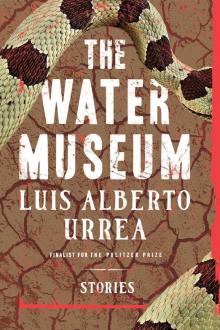 The Water Museum
The Water Museum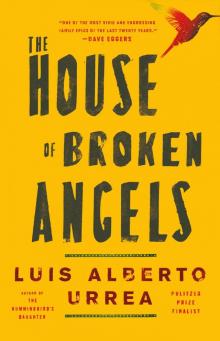 The House of Broken Angels
The House of Broken Angels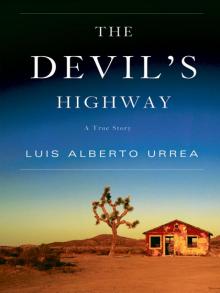 The Devil's Highway: A True Story
The Devil's Highway: A True Story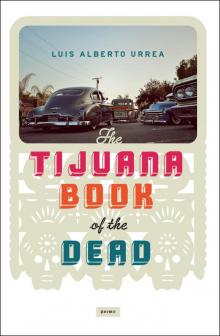 Tijuana Book of the Dead
Tijuana Book of the Dead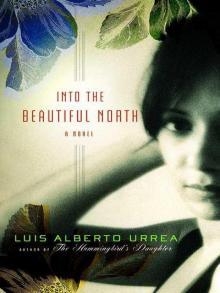 Into the Beautiful North
Into the Beautiful North